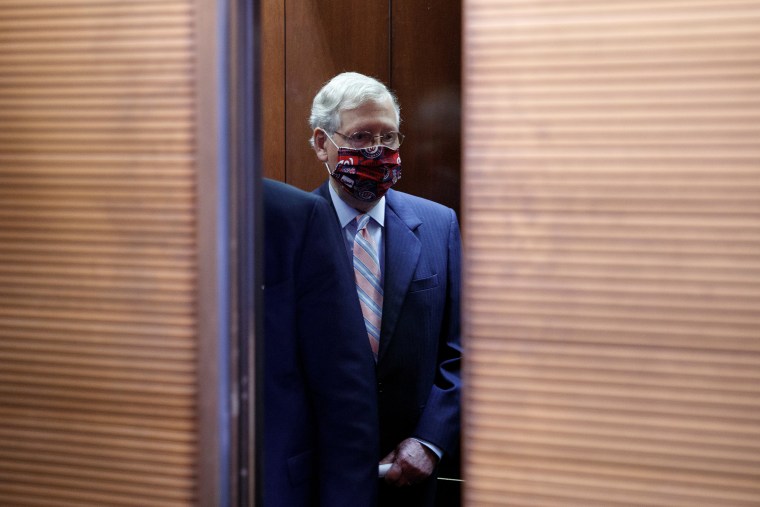WASHINGTON — No matter the actual need, there was never much chance Congress would agree to another major spending package for coronavirus relief this summer.
That's because the most comfortable outcome for all of the negotiators was failure, even as that left a few Republican senators in tough races twisting in the wind.
Senate Majority Leader Mitch McConnell, R-Ky., would like to inject more money into some level of unemployment insurance and another round of grants and low-interest loans for small businesses, and House Speaker Nancy Pelosi, D-Calif., wants expiring unemployment benefits extended and another set of stimulus checks sent out.
But McConnell was unwilling to divide his Republican ranks — so unwilling, in fact, that he waited a couple of months to counter House Democrats' $3 trillion stimulus with a $1 trillion outline and then absented himself from negotiations. And Pelosi was unwilling to sacrifice the rest of her policy goals at a time when Democrats believe they have the upper hand on the politics of coronavirus aid.
With the S&P 500 stock index at just 1 percent below its February high at the close of business Friday, there was no urgency among the donor class that tends to be heard first, most often and last on Capitol Hill. The economy may require a massive jolt, but leaving aside public need, Washington's top negotiators proved they saw little political incentive in providing it.
President Donald Trump and his team of White House negotiators sided with Republican senators who suddenly found religion on deficit spending, rather than those in heated re-election battles who wanted to show constituents they could deliver help, leaving McConnell little wiggle room.
"The challenge is to find the middle ground of what lower funding level conservatives will accept while at the same time making sure vulnerable Senate Republicans bring home relief to voters that need it," said Republican strategist Ron Bonjean, a former Senate GOP leadership aide, before talks broke off this week.
That sweet spot never materialized. Neither the White House nor McConnell had any interest in passing a House-flavored measure through the Senate with all the Democrats and a small number of Republicans. The re-election politics are a little different for Trump than they are for Republican senators in close races because he can control some flows of money from the White House; that is, while they didn't get to vote for aid to their constituents, he can make a show of trying to aid struggling Americans without Congress.
Trump called an end to the talks late Friday and on Saturday signed a series of executive orders designed as an end-run around congressional Democrats.
"I will act under my authority as president to get Americans the relief that they need," Trump said in remarks at his Bedminster, New Jersey, golf club Friday night.
Democrats could cast Republicans in the Senate, from whom they hope to take power in November, as indifferent to the suffering of millions of Americans in need of cash. McConnell didn't have to split his conference and anger his base in a year in which he and Trump are seeking re-election. They can point to Pelosi's rejection of their more conservative proposals as evidence that she is engaged in gamesmanship.
Pelosi and her House Democrats felt little incentive to come down from their number, or to agree to the White House's demand that benefits for people who are unemployed, people who are poor and state and local governments be scaled back from the House-passed bill.
The ultimate sign of their unity came Friday evening when Rep. Anthony Brindisi, D-N.Y., co-chairman of the moderate Blue Dog Coalition's task force on economic growth and one of his caucus' most politically vulnerable members, issued a thinly veiled attack on Trump and McConnell.
"Anyone who walks away from these negotiations is turning their back on the American people," Brindisi said. "This time of crisis demands action, not partisan nonsense. Failure to reach a deal is not an option."
Pelosi could have written those words herself.
Download the NBC News app for breaking news and politics
House Democrats don't appear to be in any danger of losing their majority, and they say they're in good position to withstand political backlash from Trump accusing them of rejecting half a loaf of unemployment benefits in pursuit of the whole loaf.
"Voters already know Republicans are skeptical about unemployment insurance to begin with, so they’re not going to buy some bull---- Republican argument that Democrats are the ones blocking an extension of unemployment," said one senior House Democratic aide who spoke on the condition of anonymity because he wasn't authorized to discuss party strategy. "But optics are important here. [Pelosi] cannot walk away from the talks. ... Pelosi has to consistently demonstrate an eagerness to negotiate and get a deal done."
Responsibility gets pushed to Trump, who would be most credited or blamed for the outcome anyway. That gives everyone on Capitol Hill a lot less heartburn than an ugly legislative fight a few months before an election — everyone but the handful of Senate Republicans in tough races who never even got a chance to pass a bill through their chamber.

